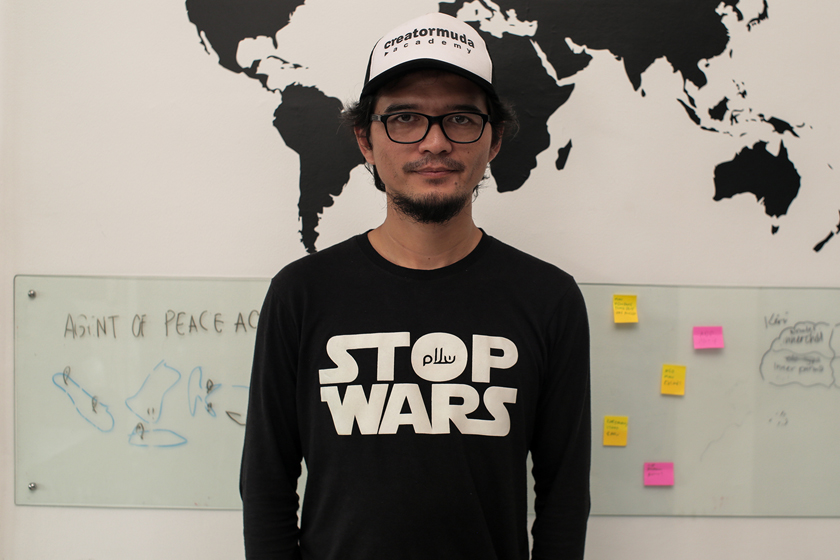Winner of the 2019 Innovation and Entrepreneurship Award
For Irfan Amalee, Alumni Awards winner in Innovation and Entrepreneurship, the digital age has challenged him to find ways to teach young people about the danger of violent extremism that are more fun and attractive than the extremist propaganda.
“We need to be more creative because their propaganda is excellent. They are using social media, their videos are cool, and their messages are consistent,” said Amalee, the founder of Peace Generation (PeaceGen), a non-profit organisation which promotes tolerance to young people.
In recent years, Indonesia has been witnessing rising extremist views among its youth.
A 2018 survey by the Center for the Study of Islam and Society (PPIM) of Syarif Hidayatullah State Islamic University, conducted on 2,181 students and teachers, found 58.5 percent of the university and middle school student respondents had a radical religious opinion. And 37.71 percent of Muslim students agreed that Jihad is a war against non-Muslims.
Amalee drew on his childhood experiences to start the peace education campaign.
Growing up in a multicultural neighbourhood in Bandung, West Java, Amalee had fond memories of friends from different backgrounds, including an Indonesian-Chinese friend and a Christian friend from Flores in East Nusa Tenggara.
But he experienced a major shift when he studied at an Islamic boarding school, or pesantren.
"The pesantren had a homogenous environment that was not exposed to diversity. It focused on how to be faithful but didn’t teach how to respond to differences," said Amalee. During this period, he was drawn to books teaching radical thoughts and slowly, he stopped socialising with his non-Muslim friends.
The deadly riots of May 1998 in Jakarta and other cities, and training in a non-violence movement in the same year, revived his interest in a peaceful, multicultural society, and diverse friendships.
Motivated by the tolerant and diverse environment he had experienced in his childhood, he became interested in promoting peace. A Youth Peace Camp in Cambodia in 2000 further fuelled his interest in peace education.
“There I saw that young people from Cambodia and Vietnam, which were once ravaged by wars, could initiate the peace movement,” Amalee recalled.
A visit to Australia in 2006, as part of the Muslim Young Leader Exchange Program, was an eye-opening experience for him. In Australia, he met Muslim communities in Brisbane and Sydney who live in peaceful coexistence with other communities.
He also met a Palestinian Imam, who was a professor at Griffith University, who shared his open-minded view on global conflicts and extremism.
"Islam prohibits extremism. Diplomacy and peaceful efforts should come first," said Amalee, recalling the Imam’s words.
The following year, Amalee, who was working in a publishing house, set up PeaceGen with his colleague Eric Lincoln.
With Lincoln’s experience as a youth counsellor and Amalee’s expertise in creative media, PeaceGen produced modules for teachers and facilitators to spread education on 12 basic values of peace. They were presented in various forms, such as illustrations, books, games, comics, video, music and other activities.
The modules come in two versions. One for primary and junior high school students, and the other to train high school and university students, as well as teachers, to become facilitators in peace education in their own communities.
“We arm the agents of peace with creative modules that make it easier to give peace education to the wider community,” Amalee said.
"Anyone can buy these modules. For those who can't afford it, we find donors to help.”
Since the modules were launched in 2007, PeaceGen has trained 5,000 people who have taught up to 50,000 students in Indonesia, Malaysia, and the Philippines. In 2009, the modules won an award from the British Council.
The modules have been printed for 10 editions and translated into English with the help of a volunteer in Melbourne. PeaceGen also works with Ruangguru.com, one of Indonesia’s biggest online teaching platforms, to make peace education widely available. So far, they have been accessed by 30,000 users.
Observing several surveys on extremism among youth which have become a growing concern in Indonesia, PeaceGen started to address the issue and aims to create opportunities for the country’s young women and men to engage as change-makers and peacebuilders in their immediate communities. In 2017, Amalee received a fellowship for the Australia Awards short course in Understanding Contemporary Terrorism and Developing Policy Responses at Deakin University, which helped him to take one step further.
“In the course, I learned in a more structured way about terrorism and countering terrorism,” said the 42-year old father of three children.
Returning to Indonesia, Amalee adopted lessons from the course to create modules for countering terrorism.
Titled “Spreading Peace, Preventing Seeds of Violence”, the new modules focus on how extremist groups recruit young people, what makes them interested, how extremist groups organise propaganda and how to pull back people who have been recruited.
PeaceGen uses a board game, which is popular among millennials, to teach the countering terrorism modules to young people, Amalee said.
He also wrote a storybook series to promote critical thinking for children, which last month won Best Children's Book Award from the Indonesian Publishers Association (IKAPI).
“Extremism tends to be black-and-white, right or wrong, and anti-diversity. Training children to have critical thinking helps them to have empathy and to look at things from different, diverse perspectives,” said Amalee.
"Extremist groups are targeting people who have limited skills in critical thinking. So we need to teach critical thinking from an early age (by using this book series),” he added.
"In the past, we only taught peace education. But now we have to teach how to counter violent extremism, which is often more about ideology and has a connection with global politics.”
Amalee believes in the power of education to combat extremism. Quoting terror survivor and education advocate Malala Yousafzai, he said: “With guns you can kill terrorists, with education you can kill terrorism”.


 Irfan Amalee arming agents of peace to combat violent extremism
Irfan Amalee arming agents of peace to combat violent extremism
